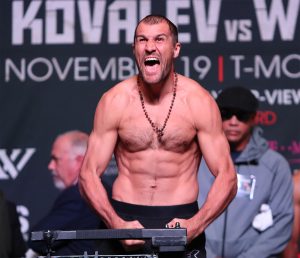At least the respect was deserved: On Sergey Kovalev-Andre Ward
By Jimmy Tobin-

Saturday night at the T-Mobile Arena in Las Vegas, Nevada, light heavyweights Sergey Kovalev and Andre Ward provided a proper prizefight for those weary of a year blighted with fights of little consequence and even less intrigue, of diluted titles both real and fantastic. To the surprise of many—including Ward, if anything can be read into the expression he wore as the victor was announced—and the disgust of plenty, Ward was awarded the victory by the narrowest of margins: 114-113 on all three cards.
The outcome is likely to be debated long after Ward and Kovalev have put the fight behind them; and for the most tenaciously outraged, perhaps even after the rematch—which there almost certainly will be—has provided some vindication. Because the explanation for Ward sweeping the last six rounds on two judges’ cards and picking up five of those six on a third, is near impossible to find in what transpired in the ring. This is not to imply judging corruption, only a sort of laziness, the judge’s fallacy that reasons that since Fighter A is no longer having the same success he had in the early rounds Fighter B must be winning. While it is true that Ward adjusted to Kovalev, and those adjustments got Ward back in the fight, the case that they won it for him was made most forcefully by people other than the “Son of God.”
Of course, a Kovalev victory in the rematch would not retroactively correct any perceived error in the scoring of the first fight; a clear, decisive (deserved?) second victory for Ward would not make his first any less controversial; nor, for that matter, should anyone expect anything more definitive in the sequel. If this is unsatisfying it is perhaps helpful to remember that, whatever your feelings on the outcome, the only nemesis either fighter has managed to find he found in the ring Saturday; and the animus they showed each other was born of respect.
Respect is something grudgingly given to Ward, who can be supercilious beyond the ropes, tedious between them, and until last night, was so far removed from a win worthy of comment he might well have been forgotten had HBO not paid so dearly for his services. But he is a great fighter—to suggest otherwise is to concede that Kovalev could struggle with anything less. Are you willing to make that suggestion?
When Kovalev sent Ward to his knees with a right hand in the second round, it seemed very much like the whispers of Ward’s decline had been right. And yet over the next ten rounds, things became more difficult for Kovalev—not easier.
Proof of this shift bore out in the clinches. Unhinged by Kovalev’s power, Ward’s early wrestling was preservative, which was telling considering his ability to work inside the clinch—and outside the margins of sportsmanship—figured to be his most glaring advantage. But as he calibrated his own offense to that of Kovalev’s, Ward turned the clinches in his favor. Working with his head on Kovalev’s shoulder, hitting while Kovalev wrestled and always delivering the last punch, Ward taxed the monster before him. That Ward managed as much while brandishing zero threat of a right hand, that he ostensibly defused a bomb with only his left, warrants praise that should not be denied him.
The effect of this inside work was nevertheless exaggerated by Max Kellerman, who approached each round like a 49er panning through the action looking only for those bits of it that allowed him to preserve a set narrative about Ward’s greatness. Kellerman also tried to dismiss the effect of Kovalev’s punches, as if his ability to force Ward to repeatedly retreat and reset was somehow inferior to the punches Kovalev calmly walked through. The commentary team’s efforts to guide rather than describe reached its low point during an absurd discussion about winning moments, as if the winner of a round could be determined by dividing each round into 360 or so moments and tallying, without any regard for quality, who earned more.
For those disgusted by Kovalev suffering so unconvincing a first loss there is this: the fight revealed that people will never see in Ward what they do not want to see and confirmed that there is more to Kovalev than the rhetoric about him suggests. Prior to the fight, it seemed plausible that his inability to put away Bernard Hopkins, a much older, slower, version of Ward, boded poorly for Kovalev’s chances. But he was better against Ward than he was against Hopkins because the moment demanded as much. As he did against Hopkins, Kovalev scored an early knockdown, and again, that knockdown came because an opponent underestimated his quickness. Unlike Hopkins, however, Ward fought to win, not stay upright, and when the outcome of the fight was thrown into doubt Kovalev responded with the type of comportment he need never have shown against the likes of Cedric Agnew and Blake Caparello. He is more than his puncher’s reputation reflects, and he out-boxed the boxer even if he could not overcome the judges.
Prior to Saturday night, Kovalev and Ward occupied somewhat tenuous positions in a sport that in lieu of quality matchups, devolves further and further into a mere cult of personality. Ward was preserved by a reputation that persisted despite his not engaging in a fight worth mentioning since 2012. But his effort Saturday night, if not the way it was awarded, provides little reason to further a grudge against him. Kovalev’s best win was a decision over a man half a century old, but if Kovalev is for you an overhyped product of HBO’s infatuation with Eastern Europeans, his disputed loss to Ward undermines your claim. Perhaps any new animus directed at them too, will be born of respect.